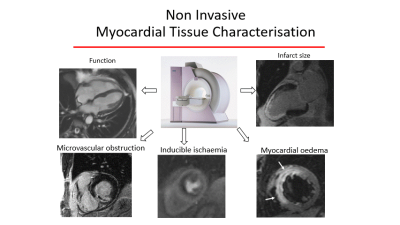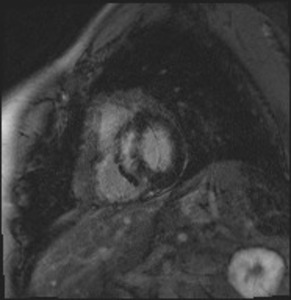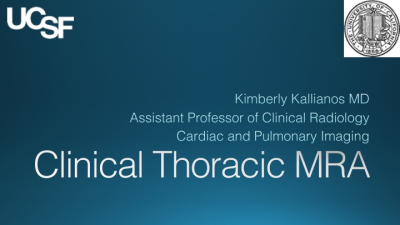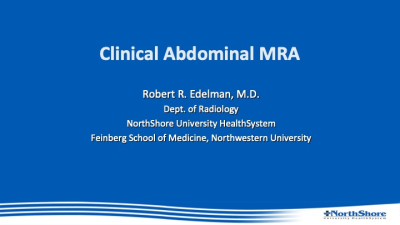Weekend Course
Introduction to Cardiovascular MR
Joint Annual Meeting ISMRM-ESMRMB & ISMRT 31st Annual Meeting • 07-12 May 2022 • London, UK

| Introduction to Cardiac Anatomy & Function with CMR | |||
| 07:45 | Cardiac Anatomy & Tissue Characterization with CMR
Kate Hanneman
This presentation will review cardiac anatomy on CMR and will discuss key sequences and findings for myocardial tissue characterization.
|
||
| 08:05 | Cardiac Function & Blood Flow with CMR Video Permission Withheld
Elsie Nguyen
This review highlights the most common MR imaging sequences used for evaluation of ventricular function such as steady state free precession imaging and briefly reviews the role of strain imaging. Tips and tricks for image optimization for functional imaging will be highlighted as well as common pitfalls. Blood flow assessment with phase contrast imaging will be explained along with practical tips for image optimization, recognizing and minimizing artifacts such as aliasing and background correction techniques.
|
||
| 08:25 | Live demos: Systems and Components |
||
| Common Clinical Applications of CMR | |||
| 08:45 |  |
CMR in Ischemic Heart Disease
Chiara Bucciarelli-Ducci
CMR has a unique role is both acute and chronic ischemic heart disease for its ability to provided in vivo tissue characterisation. The talk will focus how the imaging biomarkers from cine imaging (regional wall motion abnormalities(, edema imaging (acute myocardial injury), first pass perfusion (myocardial ischemia), late enhancement imaging (myocardial and microvascular damage) can be used by the clinician to guide decision making and treatment.
|
|
| 09:05 |  |
CMR for Heart Failure & Hereditary Cardiomyopathies
Stefan Zimmerman
A review of clinical applications of CMR in management of patients with heart failure and hereditary cardiomyopathies
|
|
| 09:25 | Live demos: Systems and Components |
||
| 09:45 | Break & Meet the Teachers |
||
| Routine Clinical Thoracic & Abdominal MRA | |||
| 10:05 |  |
Clinical Thoracic MRA
Kimberly Kallianos
Computed tomography angiography (CTA) has been the test of choice for thoracic vascular imaging. The iodinated contrast required, however, increases the risk of renal dysfunction in patients with pre-existing renal failure, which is a common comorbidity in patients undergoing vascular imaging. Clinical thoracic MRA may be performed without contrast, with gadolinium-based contrast, and with ferumoxytol, and iron-based contrast agent. Each of these approaches has unique benefits and limitations particularly in the imaging of patients with renal failure. Clinical indications, benefits, and risks of each approach will be discussed in this talk.
|
|
| 10:25 |  |
Clinical Abdominal MRA
Robert Edelman
MR angiography (MRA) provides a radiation-free approach for evaluating the abdominal vessels. Time-resolved contrast-enhanced MRA shows flow patterns that are not well assessed by CTA. In patients with impaired renal function, ferumoxytol can be used as an off-label contrast agent with the benefit of a prolonged intravascular half-life and excellent delineation of the venous system. Non-contrast MRA techniques avoid the need for a gadolinium-based contrast agent, while dark blood imaging techniques can be used to evaluate the vessel wall. In this presentation, we will consider contrast-enhanced and non-contrast MRA techniques, and present various clinical examples of MRA in the abdomen.
|
|
| 10:45 | Live demos: Systems and Components |
||
| Efficient & Focused Clinical Cardiovascular MR | |||
| 11:05 | Clinially Available Accelerated CMR Techniques Video Unavailable |
||
| 11:25 | How to Incorporate Focused CMR Protocols in a Busy MRI Practice
Elizabeth Johnson
Several strategies exist to accommodate for increased access to cardiac MR in a busy practice. Our cardiovascular division worked closely with technologists and physicists to design, build and incorporate disease specific CMR protocols into our daily practice. I will discuss the design and benefits of our focused CMR protocols, talk about the challenges in making these changes, and the ongoing work we are doing to fully streamline our CMR practice. |
||
| 11:45 | Live demos: Systems and Components | ||
The International Society for Magnetic Resonance in Medicine is accredited by the Accreditation Council for Continuing Medical Education to provide continuing medical education for physicians.